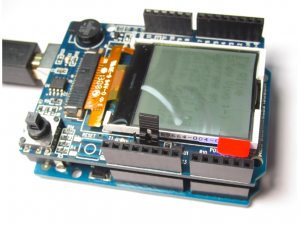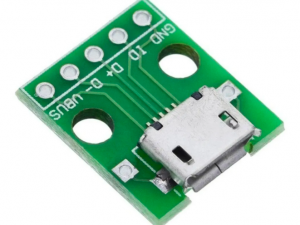Monthly Archives: April 2022
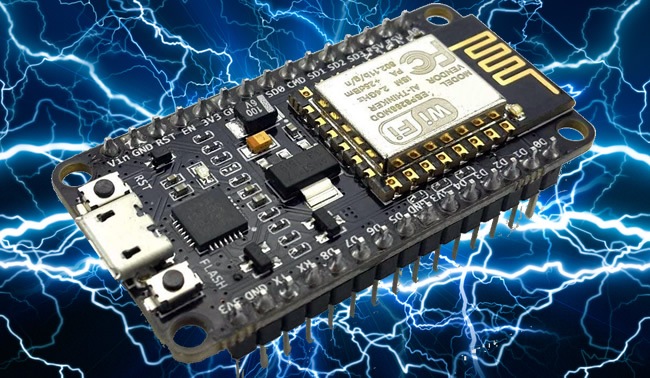
Measuring power consumption on ESP32 Modules
When using the ESP32 Module in applications that involve Wi-Fi access and battery-operated products, it is extremely important to properly qualify the power consumption of the ESP32 Module in the several power modes. The two most important reasons are:
- Designing the proper power supply or voltage regulator that powers the module
- Determine the right capacity value of the battery (for a battery operated device)
Let us check the datasheet of the ESP32WROOM32E module to get a baseline for our measurements:
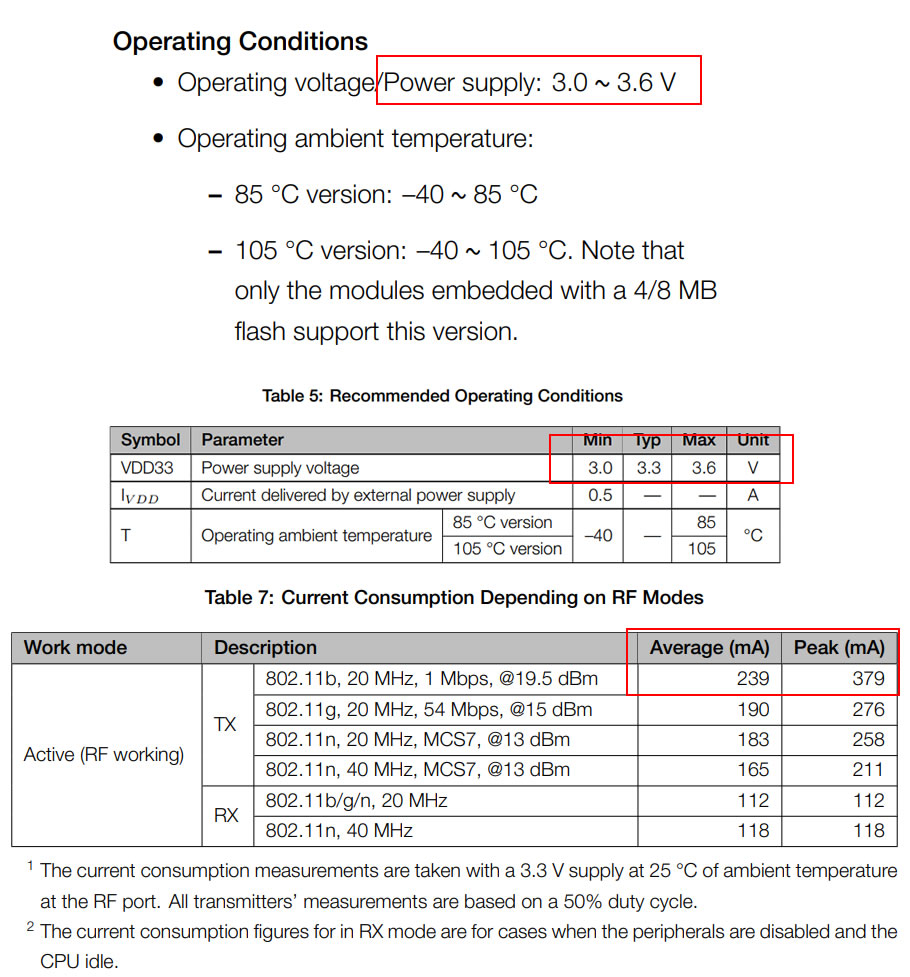
In this opportunity we will measure the (current draw of the module in the following modes:
- Transmitting Mode. Wi-Fi, sending test packages (ping) to a remote server via Wi-Fi router.
- Sleep Mode
/*
This example code is in the Public Domain (or CC0 licensed, at your option.)
Unless required by applicable law or agreed to in writing, this
software is distributed on an "AS IS" BASIS, WITHOUT WARRANTIES OR
CONDITIONS OF ANY KIND, either express or implied.
*/
#include <string.h>
#include "freertos/FreeRTOS.h"
#include "esp_wifi.h"
#include "esp_log.h"
#include "tcpip_adapter_types.h"
#include "lwip/err.h"
#include "lwip/sockets.h"
#include "lwip/sys.h"
#include "lwip/netdb.h"
#include "lwip/dns.h"
#include "ping/ping_sock.h"
static const char *TAG = "PING";
void cmd_ping_on_ping_success(esp_ping_handle_t hdl, void *args)
{
uint8_t ttl;
uint16_t seqno;
uint32_t elapsed_time, recv_len;
ip_addr_t target_addr;
esp_ping_get_profile(hdl, ESP_PING_PROF_SEQNO, &seqno, sizeof(seqno));
esp_ping_get_profile(hdl, ESP_PING_PROF_TTL, &ttl, sizeof(ttl));
esp_ping_get_profile(hdl, ESP_PING_PROF_IPADDR, &target_addr, sizeof(target_addr));
esp_ping_get_profile(hdl, ESP_PING_PROF_SIZE, &recv_len, sizeof(recv_len));
esp_ping_get_profile(hdl, ESP_PING_PROF_TIMEGAP, &elapsed_time, sizeof(elapsed_time));
#if 1
ESP_LOGI(TAG, "%d bytes from %s icmp_seq=%d ttl=%d time=%d ms",
recv_len, inet_ntoa(target_addr.u_addr.ip4), seqno, ttl, elapsed_time);
#else
wifi_ap_record_t wifidata;
esp_wifi_sta_get_ap_info(&wifidata);
ESP_LOGI(TAG, "%d bytes from %s icmp_seq=%d ttl=%d time=%d ms RSSI=%d",
recv_len, inet_ntoa(target_addr.u_addr.ip4), seqno, ttl, elapsed_time, wifidata.rssi);
#endif
}
void cmd_ping_on_ping_timeout(esp_ping_handle_t hdl, void *args)
{
uint16_t seqno;
ip_addr_t target_addr;
esp_ping_get_profile(hdl, ESP_PING_PROF_SEQNO, &seqno, sizeof(seqno));
esp_ping_get_profile(hdl, ESP_PING_PROF_IPADDR, &target_addr, sizeof(target_addr));
ESP_LOGW(TAG, "From %s icmp_seq=%d timeout", inet_ntoa(target_addr.u_addr.ip4), seqno);
}
void cmd_ping_on_ping_end(esp_ping_handle_t hdl, void *args)
{
ip_addr_t target_addr;
uint32_t transmitted;
uint32_t received;
uint32_t total_time_ms;
esp_ping_get_profile(hdl, ESP_PING_PROF_REQUEST, &transmitted, sizeof(transmitted));
esp_ping_get_profile(hdl, ESP_PING_PROF_REPLY, &received, sizeof(received));
esp_ping_get_profile(hdl, ESP_PING_PROF_IPADDR, &target_addr, sizeof(target_addr));
esp_ping_get_profile(hdl, ESP_PING_PROF_DURATION, &total_time_ms, sizeof(total_time_ms));
uint32_t loss = (uint32_t)((1 - ((float)received) / transmitted) * 100);
if (IP_IS_V4(&target_addr)) {
ESP_LOGI(TAG, "\n--- %s ping statistics ---", inet_ntoa(*ip_2_ip4(&target_addr)));
} else {
ESP_LOGI(TAG, "\n--- %s ping statistics ---", inet6_ntoa(*ip_2_ip6(&target_addr)));
}
ESP_LOGI(TAG, "%d packets transmitted, %d received, %d%% packet loss, time %dms",
transmitted, received, loss, total_time_ms);
// delete the ping sessions, so that we clean up all resources and can create a new ping session
// we don't have to call delete function in the callback, instead we can call delete function from other tasks
esp_ping_delete_session(hdl);
}
/*
ping to targer forever
interval_ms:ping interval mSec. Default is 1000mSec.
task_prio:ping task priority. Default is 2.
target_host:target host url. if null,target is own gateway.
*/
esp_err_t initialize_ping(uint32_t interval_ms, uint32_t task_prio, char * target_host)
{
esp_ping_config_t ping_config = ESP_PING_DEFAULT_CONFIG();
if (strlen(target_host) > 0) {
/* convert URL to IP address */
ip_addr_t target_addr;
memset(&target_addr, 0, sizeof(target_addr));
struct addrinfo hint;
memset(&hint, 0, sizeof(hint));
struct addrinfo *res = NULL;
//int err = getaddrinfo("www.espressif.com", NULL, &hint, &res);
int err = getaddrinfo(target_host, NULL, &hint, &res);
if(err != 0 || res == NULL) {
ESP_LOGE(TAG, "DNS lookup failed err=%d res=%p", err, res);
return ESP_FAIL;
} else {
ESP_LOGI(TAG, "DNS lookup success");
}
if (res->ai_family == AF_INET) {
struct in_addr addr4 = ((struct sockaddr_in *) (res->ai_addr))->sin_addr;
inet_addr_to_ip4addr(ip_2_ip4(&target_addr), &addr4);
} else {
struct in6_addr addr6 = ((struct sockaddr_in6 *) (res->ai_addr))->sin6_addr;
inet6_addr_to_ip6addr(ip_2_ip6(&target_addr), &addr6);
}
freeaddrinfo(res);
ESP_LOGI(TAG, "target_addr.type=%d", target_addr.type);
ESP_LOGI(TAG, "target_addr=%s", ip4addr_ntoa(&(target_addr.u_addr.ip4)));
ping_config.target_addr = target_addr; // target IP address
} else {
// ping target is my gateway
tcpip_adapter_ip_info_t ip_info;
ESP_ERROR_CHECK(tcpip_adapter_get_ip_info(TCPIP_ADAPTER_IF_STA, &ip_info));
ESP_LOGI(TAG, "IP Address: %s", ip4addr_ntoa(&ip_info.ip));
ESP_LOGI(TAG, "Subnet mask: %s", ip4addr_ntoa(&ip_info.netmask));
ESP_LOGI(TAG, "Gateway: %s", ip4addr_ntoa(&ip_info.gw));
ip_addr_t gateway_addr;
gateway_addr.type = 0;
gateway_addr.u_addr.ip4 = ip_info.gw;
ESP_LOGI(TAG, "gateway_addr.type=%d", gateway_addr.type);
ESP_LOGI(TAG, "gateway_addr=%s", ip4addr_ntoa(&(gateway_addr.u_addr.ip4)));
ping_config.target_addr = gateway_addr; // gateway IP address
}
ping_config.count = ESP_PING_COUNT_INFINITE; // ping in infinite mode, esp_ping_stop can stop it
ping_config.interval_ms = interval_ms;
ping_config.task_prio = task_prio;
/* set callback functions */
esp_ping_callbacks_t cbs = {
.on_ping_success = cmd_ping_on_ping_success,
.on_ping_timeout = cmd_ping_on_ping_timeout,
.on_ping_end = cmd_ping_on_ping_end,
.cb_args = NULL
};
esp_ping_handle_t ping;
esp_ping_new_session(&ping_config, &cbs, &ping);
esp_ping_start(ping);
ESP_LOGI(TAG, "ping start");
return ESP_OK;
}Test Setup #1
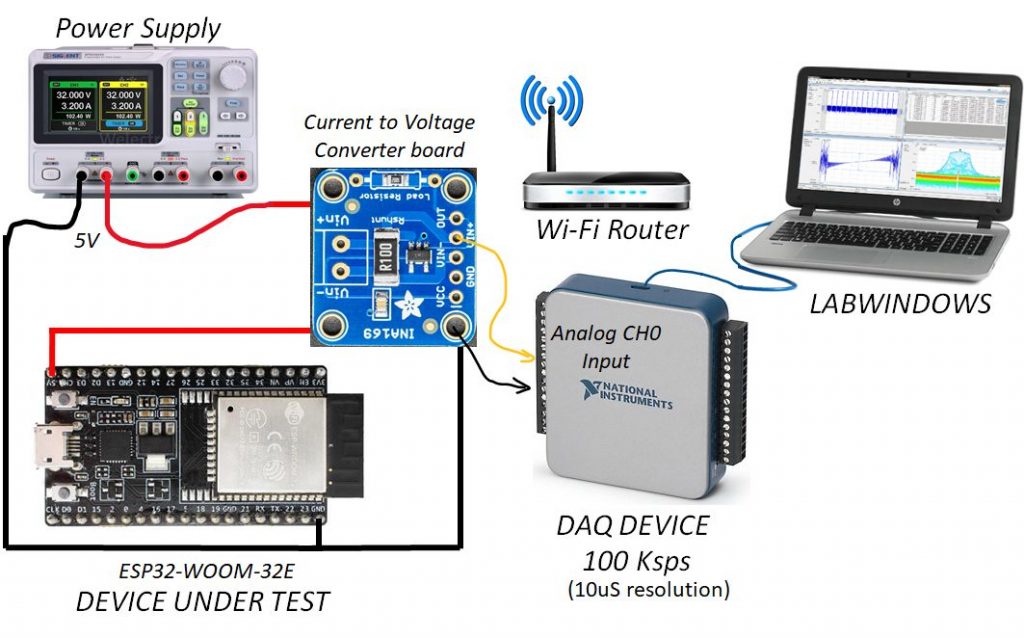
Test Setup #2
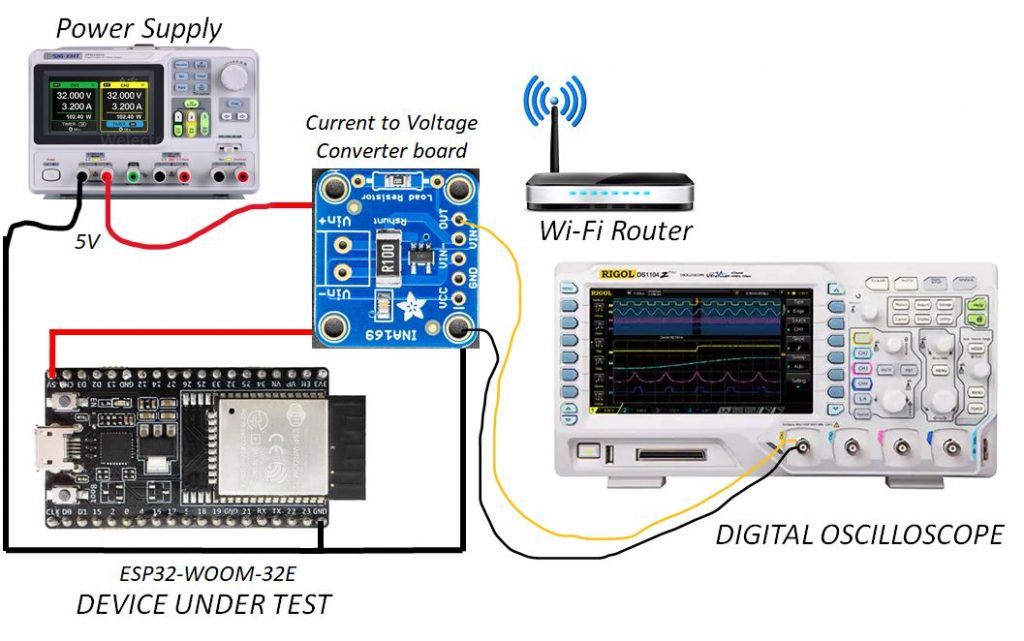
Current to Voltage converter board based on the INA169 chip
Using a sense resistor of 0.1 Ohms and a load resistor of 10K, the out voltage vs input current of the sensor board is calculated as this: Vo = Is Rs RL/1k, Vo= Is x 0.1 x 10K/1K Vo = Is; thus the ratio between input current and output voltage is 1.
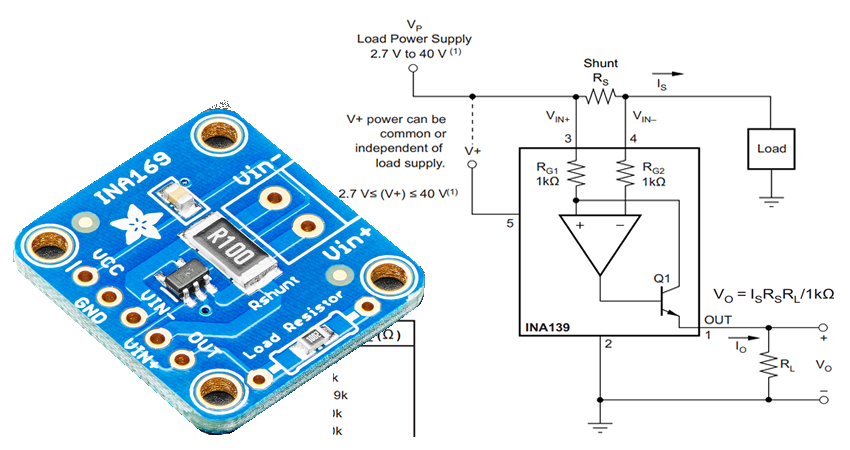
Results with DAQ Device:
With Module powered OFF
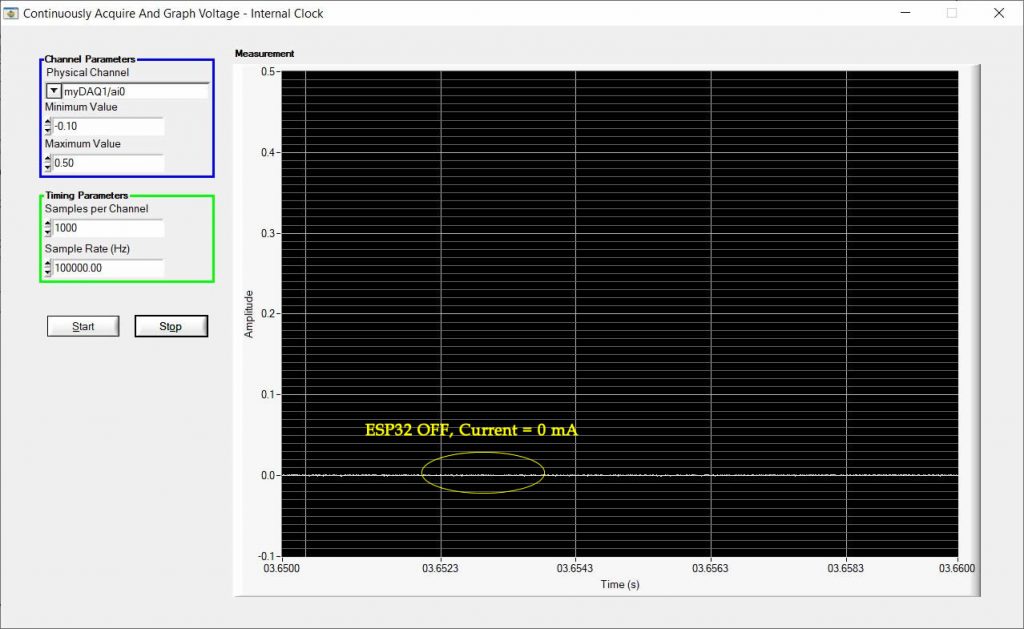
With Module transmitting Wi-Fi packages, measurement using the DAQ system
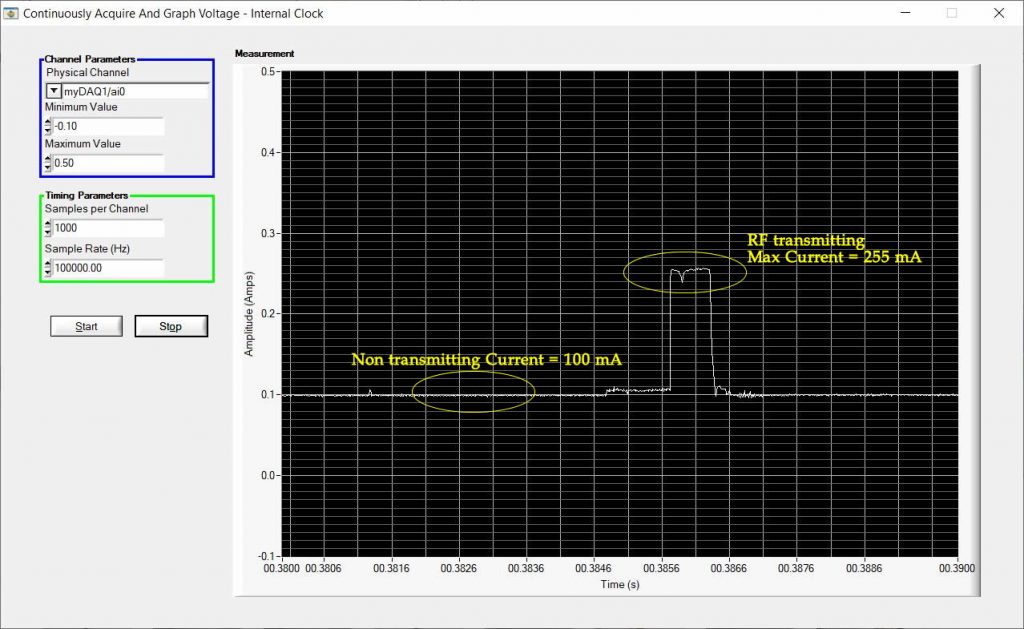
Here we discovered that average current of the ESP32 while transmitting Wi-Fi packets is 255mA, slightly higher than what is presented in the datasheet (239mA). Data captured does not show any significant peak of current. The current when not transmitting is about 100mA and that is what a normal multimeter should measure. The measurements with the DAQ device are nice, however, we have to take into account the limitations of this measurement due to the fact of the sampling rate of the DAQ, because of the limited samples acquired at high frequency, we may be losing peaks of current that occur faster than our sampling rate. Keep in mind these data when choosing a voltage regulator to power the ESP32 module, if the device is being powered by a typical USB port from a computer, which simultaneously is powering other devices you might encounter transmissions disruptions if the 500mA current limitation of the USB2.0 bus is surpassed.
Measurement using Test setup #2
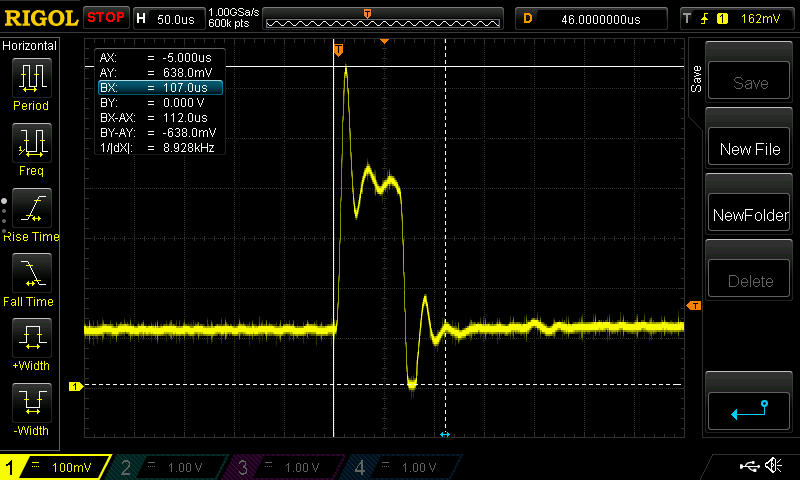
With the oscilloscope we have the advantage of high bandwidth for the measurement. We feed the output of the current sensor into CH1 of the oscilloscope and triggered the instrument with the same channel on the rising edge of the waveform. We discovered how the current peaks up to 638mA for about 25uS, and average current for transmissions is 400mA. The current consumption during no transmissions is still the same, 100mA. Total burst of current during transmissions last for 107uS.
Over imposing both measurements:
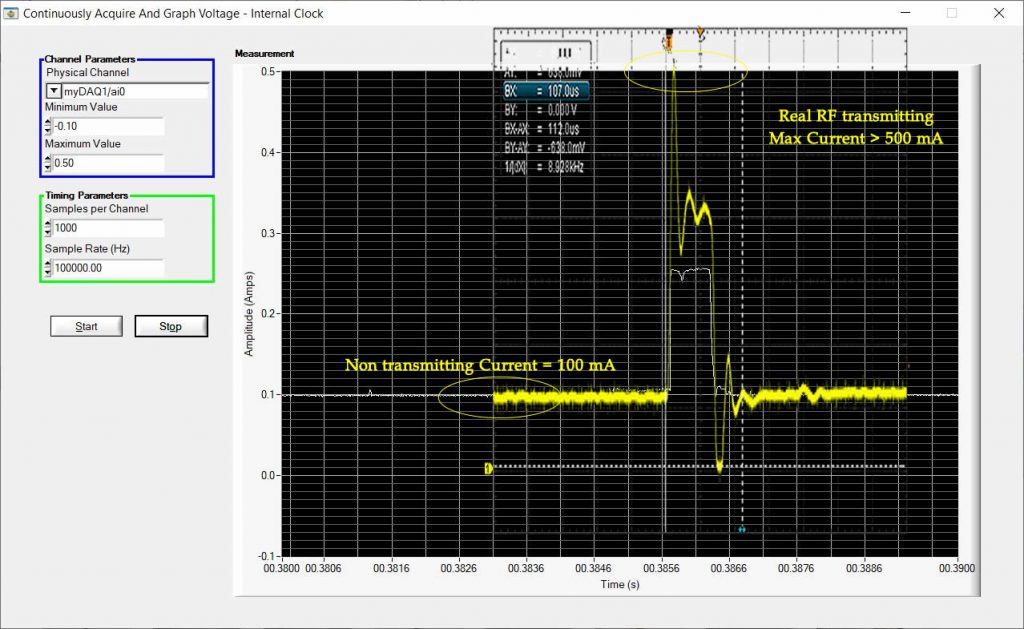
Note: All current measurements were taken while powering the ESP32 device at 3.3V. The datasheet of the module can be downloaded here:
esp32-wroom-32e_esp32-wroom-32ue_datasheet_en.pdf
